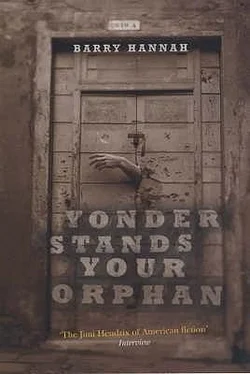Raymond watched their faces. Then he looked up the yard at Melanie coming down the hill, bringing cold beers to them. Sweetness and light, he thought. She was amazing. A face and body kept lineless by virtue, self-sacrifice.
Ulrich had been quiet, painting on deck varnish. Now he spoke. “We don’t love each other as much as we used to. You can see the uncertain looks, the calculations, the dismissals. People are not even in the present moment. Everybody’s been futurized. You look in those eyes and see they’re not home, they’re some hours ahead at least. I hate to go into Vicksburg anymore. Anywhere, really. It’s all like meeting people who have just departed. Old men and women don’t look wise anymore. They are just aged children. And who gets the highest pay? Actors. Paid to mimic life because there is no life. You look at everybody and maybe they’re a little sad, some of ’em. They’re all homesick for when they were real.” Ulrich began painting again as the others tried to guess what could have prompted this.
“Did you see them orphans?” asked Sidney.
“Orphans?” asked Ulrich. “Who isn’t an orphan, I ask you?”
Sidney had a living father who he wished were dead. Pepper Farté hated almost everything that moved. To buy something in his bait house was like pulling goods from the hands of a vicious hermit. When Sidney himself entered the store, the older man became livid, angry at the custom that demanded you acknowledge your son. Sidney was going to correct Ulrich, but then he recalled these matters and merely sneered.
“When you’re crazy like me, the brain keeps you warm. I haven’t had a long-sleeve shirt on all year,” Ulrich reflected.
“Shortness of air to the head is what explains you,” said Sidney.
“I wonder who is helping that poor couple with the orphans,” said Melanie. She handed a beer to Ulrich. “I don’t think you should be breathing paint in your condition, Mr. Ulrich.” She patted his shoulder. Ulrich painted on. She smiled.
Harvard watched Melanie in reverence.
I could love this woman too , thought Raymond. Like a Madonna. Maybe she is all the vision I’ll ever get. How can you have a faith without a vision now and then?
The woman has been graceful so long, kind so long .
A vision cannot be indefinite, an apparition. No, you go down the road and you see something there, dense and none other like it. Those of us who want visions can’t have them, maybe. They are given to old fools like Ulrich. I love him too. A better man than I am . Raymond thought this and then had a bluegill on. But what of the other night when I became so glad all of a sudden and for no reason that there was an Ireland, and that the natives of its villages were going about their ways, to and fro, from stone cottages and green rocky hills. I had an ecstasy thinking that. What was that?
Melanie walked with her small ice chest back up the pier and continued around the cove on an unknown journey. Her walking made no sense until she rounded the inlet with its thick lily pads, then went on to the point where the black man John Roman sat on his bucket fishing. It began to rain a little. The figures over there were small, but the man watched as she handed the fisherman a cold beer. He took it. The rain sparkled over the bent willows above the two.
Fairly soon, as it began to rain thickly, the pier crowd beheld this woman on the back of Roman’s motorbike, clutching his stomach, as he rode them out of the trees and up the long rise to her house. Small figures, they entered her kitchen together.
“Lookee. She’s steppin’ out on you, Harvard,” said Sidney with a wide sneer. “She been wantin’ it, but she can’t wait forever, eh, eh.”
This man of great dignity and honors, the man I should have been , Raymond thought, watching Harvard again, poleaxed by love and this old guttersnipe Sidney. His eloquent white hair flattened out and dripping, eyes stupid. Like a bum with a ruined wig.
Down in the south corner of the lake, Mortimer watched the absurd floor and roof on pontoons move toward him. Two adults and crammed with children. He did not like children. But he became suddenly alert when he noticed the two fourteen-year-old girls leaning on the rail his way. They both smoked in the sullen manner of the hopeless. One was already bosomy. The other had fine bare shoulders. Just budding upper frame, but muscled long legs. Then he stared at the adults. They had loony smiles, but there was something depleted about them both. They must be church people, he decided. That stupid hope on their faces. That trust that they were always on the Lord’s stage, pulled by the strings of a larger design. Looking for a cross. Maybe these brats themselves. He heard a few curses shouted his way, but the adult couple seemed oblivious. Speakers of another tongue.
He knelt here at the boat ramp with chipped granite boulders banked close to it, red sand to either side. It was his first time at the lake, he had come to take a boat from a man deeply in debt to him. The man had wanted to fish one last time in it. He was waiting. The girls were the first exciting thing he’d seen in weeks.
At this juncture he had no plans to hurt people around the lake. He did not like bodies of water much, had never seen the ocean. He was indifferent to trees. Soil was hateful to him, as was the odor of fish. But like many another man forty-five years in age, he wanted his youth back.
He wanted to have pals, sports, high school girls. This need had rushed on him lately. He lived in three houses, but he had no home. He did not like the hearth, smells from the kitchen, an old friend for a wife, small talk. It all seemed a vicious closet to him. He moved, he took, he was admired. But he had developed a taste for young and younger flesh. This was thrilling and meant high money. Men and women in this nation were changing, and he intended to charge them for it.
Religion had neither formed nor harmed him. Neither had his parents in southern Missouri. But he despised the weakness of the church, and of his parents, whom he had gulled. He was a pretty boy born of hawk-nosed people. It was a curse to have these looks and no talent. Long, lank. Hooded eyes, sensual lips that sang no tune. Still, he quit the football team because of what it did to his hair, claiming a back ailment that had exempted him from manual labor since age fourteen. There are thousands of men of this condition, most of them sorry and shiftless, defeated at the start. Many are compulsives and snarling fools, emeritus at twenty.
His parents doted on him. The pew in the church also hurt his back, he said. But he would go with them now and then, a martyr. Because already he liked to mock the sheepish Methodist minister, to whom the world was a terror from which he led his little flock in long, constant retreat. The hymns of this church were like the moan of doomed animals to his ears.
Mortimer’s parents were both unassertive postmen. They had no other children but kept a chicken yard in the back, which mortified him. He was often in the house alone, indisposed to school, to the wretched town, where almost everybody walked with a sag. A neighbor boy showed him a pornographic picture when he was fifteen, and the bone-deep thrill of seeing that woman in her happy pain had never left him, had never diminished. He looked for it behind every curtain of culture, of law.
His likeness to Fabian had attracted many girls, then women, often several at once. They loved his brooding, his shy muttering, his brute eyes. He seemed all hooded by his brows even when he had nothing on his mind. The thick wavy hair was eloquent for him. These were girls of lesser elegance, lesser clothes, lesser cuteness, but nice enough.
At home one evening he screamed out suddenly that he didn’t have a fine car or any money, and he knew that the two of them, his parents, were hiding it for themselves. He promised he would never attend their funerals. There would be no grown son to honor them when they passed. He frightened his mother and father. They gave him a nice car and money. When he got enough, he left them. There was other money too, from the three girls who left with him, one of them a student teacher from a nearby college. She was his first conquest of the better sort, the scioness of a middling-wealthy owner of a department store. She had good legs, spectacles, grammar. He spent some years doing manual labor but cushioned by women, who gave him money. Then around thirty he found his calling, as most do.
Читать дальше











